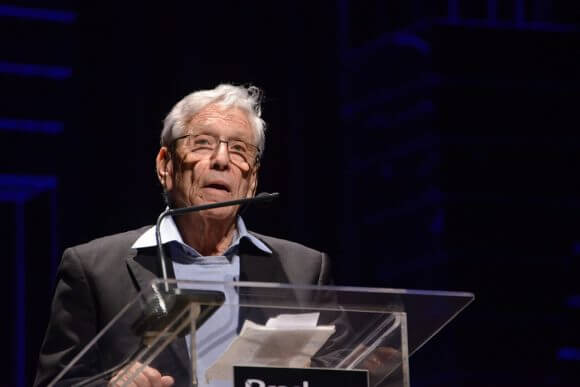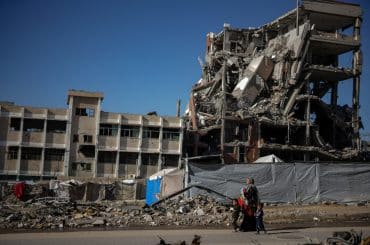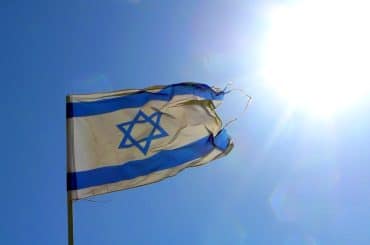This is part of Marc H. Ellis’s “Exile and the Prophetic” feature for Mondoweiss. To read the entire series visit the archive page.
Though for some the passing of Amos Oz is a time for mourning an international literary figure, on the political scene, regarding Israel’s place in the world, another question is in the air: Has the liberal Zionism, Oz represented, come to an end?
Broadly defined, liberal Zionism is the pairing of Jewish suffering in the Holocaust and the empowerment of displaced European Jews in Israel as a Jewish and democratic state. Though some have always questioned whether a Jewish state can be a democracy for all its citizens, Jewish and non-Jewish alike, the seeming permanence of Israel’s occupation and settlement of Jerusalem and the West Bank during last decades, along with its stranglehold on Gaza, has increased the scrutiny of such a possibility. So more is at stake than Oz’s liberal Zionism.
Though Oz’s political life can be parsed in various ways, his passing should be seen in this broader historical perspective. One way of broadening this view is to see Oz’s death as a bookend to the death of Elie Wiesel in 2016. With Wiesel’s death some believed that the era of Holocaust consciousness, as a powerful force on the Jewish and international scene, closed.
The passing of Wiesel and Oz provides a window into the insurgent Jewish past and the stalemate Jews find themselves in today. What Wiesel and Oz’s legacy says about the future is troubling. Without Wiesel and Oz representing the Holocaust and liberal Zionism, could the Jewish future, previously defined by the Holocaust and Israel and now besieged by internal and external critics, unravel?
Wiesel’s early writings on the Holocaust subverted the Jewish self-understanding of progress and enlightenment. In the new age, the Holocaust became the defining event in Jewish history. For Wiesel, Israel was the defining response to the Holocaust. To be Jewish after the Holocaust is to remember Jewish suffering and embrace Jewish empowerment in Israel.
As the Holocaust-Israel axis took hold among Jews around the world, Israel’s occupation of the Palestinian territories and wars in Lebanon and Gaza took on new dimensions. In Israel, Oz, already known for his literary efforts, emerged on Israel’s political scene as an Israeli patriot and a critic of Israel’s excesses. In his political commentaries, Oz attempted to hold together the Israel that Wiesel and many other Jews envisioned, as a response to the Holocaust and as a liberal bastion of collective Jewish life.
Though initially provocative, over the decades both Wiesel and Oz became increasingly disappointing as thinkers and moral witnesses in Jewish life. Initially, their writings about Jewish history and ethics was subversive in many quarters of the Jewish and Israeli community and their vision of Israel spoke to other communities in different parts of the world as well. Over the past decades both grew defensive and stale. Wiesel and Oz increasingly used their liberal ideas as a defensive shield over against their critics within and outside the Jewish community. Their witness became belligerent.
Like Wiesel, Oz, with many of his liberal Zionist contemporaries, and with a critical edge, wrapped himself in the flag of an imperfect but viable Jewish history and ethical tradition. In Oz’s commentaries, Israel is decidedly flawed, its occupation of the Palestinian territories is politically wrong-headed, but Israel, as essential to Jews, is fundamentally sound. What Jews need and deserve is a state of their own. Palestinian rights are secondary to those of Jewish Israelis; Palestinian politics and culture are questioned in their honesty and depth. To Oz and his liberal Zionist contemporaries, Palestinians are less deserving than Jews and sometimes their descriptions of Palestinians are worse. Critics of Israeli policies toward Palestinians are viewed in the same light. Those to the Left of Oz and liberal Zionists in general are seen as either on the side of Israel’s destruction or perilously close.
Has the world been diminished by Oz’s death? There is little doubt about his literary endeavors. But over the decades, Oz’s political side, while having its moments of clarity, became stuck in a narrative of Jewish history and statehood that seems fated. Without the narrative of Jews being innocent in suffering and empowerment and, if flawed, at least liberal and democratic, what does it mean to be Jewish? And why should Jews and, as importantly, Christians in the West, European governments and the international community, support Israel as it systematically violates Palestinian human rights? If the veneer of liberal Zionism is worn thin, and the memory of the Holocaust becomes increasingly seen as an enabler of injustice against Palestinians, do Jews and others simply accept Israel as what some increasingly identify as a colonial settler state?
Like Wiesel, Amos Oz was a witness to the destruction and reemergence of Jewish life in the formative events of the Holocaust and the birth of the state of Israel. What they also experienced but couldn’t fathom was the formative event of Palestinian freedom as a demand on Jewish history. In missing the next question of Jewish life, while trying to deflect and demean those who did, Oz’s liberal Zionist witness became tarnished and, like Wiesel’s Holocaust consciousness, fated.



It baffles me that someone like Wiesel could in any way be considered a ‘liberal’. He was an out and out tribalist, and a most unpleasant human being. He only cared about wrongs done to his tribe and was endlessly indulgent of wrongs done by his tribe. Remember that grotesque screed he penned about how Palestinians practice ‘child sacrifice’? A slander so horrid even the Murdoch Times rejected it, though the Guardian was happy to publish it.
And ain’t it interesting that despite Wiesel’s ‘love’ for Israel, he chose never to live there. I guess being self-appointed spokesman for the holocaust industry isn’t as lucrative there.
As for Oz, he was a schlock artist, who, in the words of the ‘Angry Arab’ “never met an
an Israeli war or an act of aggression which he did not bless. Every one of them, including the recent wars on Gaza and the July war on Lebanon in 2006. But he has a ploy: he supports every war but then in the last days of the war, he issues a statement in which he calls for an
end to this war which he just had blessed. He is not opposed to Israeli killing of children but he will speak out if the number of children killed exceed a certain percentage. This is in a nutshell is Zionist liberalism for you. He supported the apartheid wall but believed it
should have taken a different route. Amos Oz was not the man Western liberals wanted him to be. But then again: Western liberals are capable of turning Netanyahu into an enlightenment idol.
“
@Maximus: Primo Levi on Israel: https://www.haaretz.com/world-news/europe/.premium.MAGAZINE-when-words-failed-the-great-primo-levi-1.5463446
Thus, his relations with the State of Israel were enthusiastic but tortured. Levi was not neutral or indifferent toward it. He felt a profound connection to the other Holocaust survivors who found refuge there. However, when it came to the Israeli-Palestinian conflict, his opinions were close to “the left” – that persecuted group, the object of deep hatred in Israeli society today. The Lebanon War and the slaughter in 1982 in the Sabra and Chatila refugee camps caused him to speak out for the first time and demand that Prime Minister Menachem Begin, whom he perceived as a “fascist,” resign…. In 1984 Levi said that the deterioration of political life in Israel was disturbing to him. He, who had said that “the oppressed of those days were human beings like ourselves” – meaning that someone who is oppressed can become an oppressor – now had to watch this reversal taking place before his eyes. He therefore believed that Israel’s role as the unifying center of Judaism was in decline and believed that this center was moving to the Diaspora where it would be preserved better than it had been to date.
More on how much Wiesel hated Hungarians, wanted revenge on them, and also hated his fellow Jews caught up in the Holocaust: Newly unearthed version of Elie Wiesel’s seminal work is a scathing indictment of God, Jewish world https://www.haaretz.com/jewish/.premium-harsher-version-of-night-found-in-elie-wiesel-archive-1.5377614
Wikipedia:
Franklin writes that Night is the account of the 15-year-old Eliezer, a “semi-fictional construct”, told by the 25-year-old Elie Wiesel. This allows the 15-year-old to tell his story from “the post-Holocaust vantage point” of Night’s readers.[62] In a comparative analysis of the Yiddish and French texts, Naomi Seidman, professor of Jewish culture, concludes that there are two survivors in Wiesel’s writing, a Yiddish and French. In re-writing rather than simply translating Un di Velt Hot Geshvign, Wiesel replaced an angry survivor who regards “testimony as a refutation of what the Nazis did to the Jews,” with one “haunted by death, whose primary complaint is directed against God …” Night transformed the Holocaust into a religious event.[63]
Seidman argues that the Yiddish version was for Jewish readers, who wanted to hear about revenge, but the anger was removed for the largely Christian readership of the French translation. In the Yiddish edition, for example, when Buchenwald was liberated: “Early the next day Jewish boys ran off to Weimar to steal clothing and potatoes. And to rape German shiksas [un tsu fargvaldikn daytshe shikses].” In the 1958 French and 1960 English editions, this became: “On the following morning, some of the young men went to Weimar to get some potatoes and clothes—and to sleep with girls [coucher avec des filles]. But of revenge, not a sign.”[64]
@echinococcus, et al
http://www.rense.com/general63/alie.htm
From Daniel A. McGowan
Director – Deir Yassin Remembered
A Program Service of the Middle East
Cultural and Charitable Society, Inc.
February 26, 2005
Pastor James Gerling
32 North Brook Street
Geneva, NY 14456
Dear Pastor Gerling:
“In the March issue of The Geneva Presbyterian it was stated that the adult Sunday school class will be shown a film narrated by Elie Wiesel, a ‘great humanitarian.’
“Might I caution your readers not to be fooled by the mystical charm of Elie Wiesel, who is the icon of what Norman Finkelstein (in his book by the same title) calls The Holocaust Industry. Far from being a great humanitarian, Wiesel, as Noam Chomsky contends, is simply ‘a terrible fraud.’
“Wiesel is often quoted as saying that ‘the opposite of love is not hate; it is indifference.’ He has devoted his life to carefully crafting articles and speeches about oppression, genocide, and man’s inhumanity to man. Yet when asked about the oppression and dehumanization of Palestinians by Israel, he ‘abstains’ and dismisses the subject claiming ‘I cannot say bad things about Jews,’ or ‘Such comparisons are unworthy.’
“His eloquent, unwavering support of Zionism has caused him to condemn Palestinians, who are the victims of the colonial expansionism epitomized by the illegal settlement of over 420,000 Jews in the occupied territories of the West Bank and the Gaza Strip. He degrades Palestinians with racist remarks, such as claiming they use their children as shields for adults throwing stones and worse.
“In a 2001 editorial Wiesel dehumanized Palestinians and Muslims far more than his usual ‘indifference.’ He argued that only Jews should have sovereignty in Jerusalem because the name Jerusalem appears more than 600 times in the Bible while it does not appear at all in the Koran. If this is not convincing enough, Wiesel will tell you that Jerusalem is the most holy city for Jews while it is only the third holiest city for Muslims, and therefore Israel should exclusively control it as an eternal part of the Jewish state. Of course, as a loyal Zionist, Wiesel is never troubled by the fact that over half of the people within the borders controlled by Israel are not Jews, so that it is impossible to have ‘the Jewish state’ and a democracy at the same time.
“But it is the quest by Palestinians for their ‘right of return’ that causes Wiesel to move from ‘indifference’ to outright lies. In the same editorial he wrote, ‘In 1948 David Ben-Gurion reached out to what was to be the Palestinian state,’ but the Arabs rejected peace and invaded Israel. Wiesel knows that this is patently false. He knows that widespread ethnic cleansing of Arabs took place before the declaration of the state of Israel and the opposition by Arab armies.
“He knows from personal experience that on April 9, 1948 Arab civilians, including women and children, were murdered in cold blood in the village of Deir Yassin on the west side of Jerusalem by Jewish terrorists known as the Irgun and the Stern Gang. Wiesel worked for the Irgun, not as a fighter, but as a journalist and knows the details of this infamous (but not the only nor the largest) massacre of Arabs by Jews. And while he piously demands public apologies for atrocities committed against Jews (for example in 1946 at Kielce, Poland), he has never been able to apologize for the atrocities committed by his own employer.
“Wiesel pontificates that Auschwitz ‘represents a grave theological challenge to Christianity.’ The implication is that Christians created the Holocaust and should apologize to Jews repeatedly and never criticize Israel. That is the essence of his ecumenical deal: we Jews may some day forgive what you Christians did to us (and only to us) in the Holocaust (spelled with a capital H) if you promise to ignore what we have been and continue to do to the Palestinians in our Zionist quest to build a Jewish state. Questioning any aspect of the Holocaust discourse is to be considered ‘Holocaust denial’ and therefore evil. So is mentioning the concentration camps built by Israel to incarcerate Palestinians (e.g., Ketziot in the Negev Desert); so is mentioning the relentless persecution, dispossession, and murder of Palestinians in the name of Zionism for over 100 years.
“Wiesel supports ‘the right of return’ for Jews, but only for Jews. An American Jew, who can trace his ancestors back to the Revolutionary War, has the right to return to Israel, obtain dual citizenship, obtain subsidized housing on land expropriated from Palestinians, and drive to settlements on roads ‘for Jews only.’ Palestinians who can trace their ancestors to the same land for centuries and who have a title and key to property from which they were driven in 1948 have no right to return. Why not? Because, Wiesel explains, it is ‘unthinkable; young Palestinians faces are twisted with hate; it would be suicide for the Jewish state.’ This is incredible hypocrisy especially from a professor of humanities and a Nobel Peace Prize recipient.
“Perhaps it is not feasible for all Palestinians to return to their homes lost in 1948. But Wiesel cannot even bring himself to tell the truth about what caused their diaspora. He continues to spread one of the most insidious myths in Zionist discourse saying, ‘Incited by their leaders, 600,000 Palestinians left the country convinced that, once Israel was vanquished, they would be able to return home.’
“Wiesel knows Arab leaders did not tell their people to leave; that lie was thoroughly disproved by historians years ago. Second, he knows that the best estimates are that 750,000 Palestinians fled in 1948. (Note the outrage by Wiesel and others whenever anyone dares to question the number of 6 million Jews killed in the Holocaust.) And third, these original Palestinian refugees did not just leave; they were driven out, often by the very terrorists for whom Wiesel proudly worked. The massacre at Deir Yassin was emblematic of this.
“For years Wiesel has remained silent regarding the suffering and injustices committed against the Palestinian people by Zionists, including Christian Zionists like Pat Robertson, Jerry Falwell, and Franklin Graham. Many students and scholars found his silence to be hypocritical, especially after his trilogy entitled Against Silence wherein he passionately and piously encouraged readers to fight oppression in all of its forms. But it is this very indifference towards the Palestinians that takes away any ‘moral high ground’ that might otherwise be attributed to him.
“Even when Wiesel goes to Jerusalem and stays at the King David Hotel, he cannot help but see Palestinian faces. (One wonders what he thinks when he is alone in the famous hotel that was bombed by his employer, The Irgun, killing scores of Englishmen and 15 innocent Jews.) He can go to the Jewish quarter of the Old City and pray at the Wailing Wall. But on top of that wall are those same goyim praying to his God whom they call Allah. And when he goes to the most famous Holocaust memorial at Yad Vashem one wonders if he is refreshed to be in ‘Jewish Jerusalem’ or is he haunted by the thought that the museum is built on the Arab lands of Ein Karem. When he walks through the new tunnel at Yad Vashem to emerge in the sunlight and face the Jewish settlement of Har Nof, is he at all troubled by the fact that he is also looking at the homes of Deir Yassin? Can he see the Palestinian faces of those who were piled up and burned in the quarry on the hill directly across from the museum? And when he goes to the settlement called Gilo, does he speak with Moshe Ben Eitan who ordered the wounded Arab women and children at Deir Yassin to be shot so they would not tell what his and Wiesel’s employer did there?
“The answer to these questions is “No, no, and no again.” And the answer to the question, “Is Elie Wiesel a great humanitarian?” is also a resounding ‘No.'”
Sincerely,
Daniel A. McGowan
Director
Deir Yassin Remembered
A Program Service of the Middle East Cultural
and Charitable Society, Inc.
4078 Scandling Center